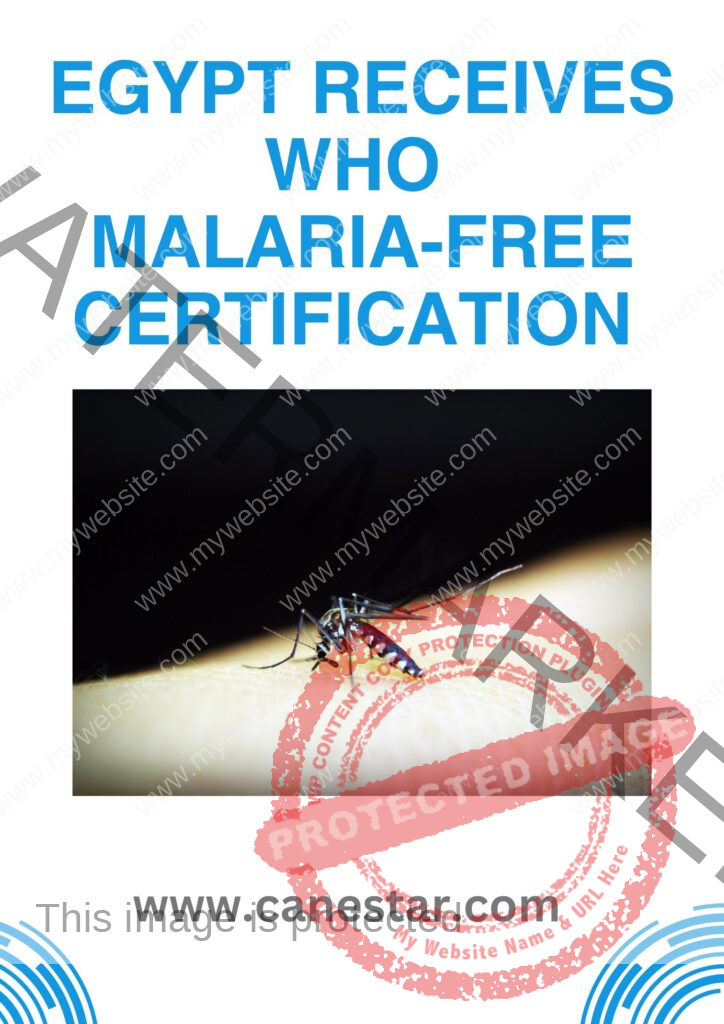Egypt Receives WHO Malaria-Free Certification
Egypt Receives WHO Malaria-Free Certification

- What is a WHO malaria-free certification?
This certification is an official recognition from the World Health Organization (WHO) that a country is free from malaria. It means that malaria transmission through mosquitoes has been stopped nationwide for at least three years. The country must also prove that it can prevent malaria from returning. The final decision is made by the WHO Director-General, based on advice from experts. - How many countries have been certified malaria-free in the WHO Eastern Mediterranean Region and globally?
Egypt is the third country in this region to be certified malaria-free, following the UAE (2007) and Morocco (2010). Worldwide, 44 countries and one territory have been certified malaria-free. - When was malaria first detected in Egypt?
Malaria has existed in Egypt since 4000 B.C. Evidence of the disease was found in ancient Egyptian mummies, including Tutankhamun. In the past, cases were reported near the Nile River, where mosquitoes thrived. - When did Egypt start its malaria control efforts?
In the 1920s, Egypt started reducing contact between people and mosquitoes by banning rice cultivation near homes. In 1930, malaria became a “notifiable disease,” meaning that all cases had to be reported. The first malaria control station was opened soon after. In 1936, a survey in Lower Egypt showed malaria rates ranging from less than 1% in Giza to around 40% in other provinces.
During World War II, Egypt saw a sharp rise in malaria cases due to disruptions in public health services. The country responded by setting up treatment centers and hiring over 4,000 health workers.
- What happened after World War II?
In the 1950s and 1960s, Egypt made great progress in controlling malaria through mosquito control efforts, such as applying chemicals to water where mosquitoes breed. Economic development and the use of DDT insecticide also helped reduce malaria cases.
The construction of the Aswan Dam in 1969 increased the risk of malaria near the Sudan border. To address this, Egypt launched a joint project with Sudan in 1970 to control mosquitoes and monitor public health in the area.
- How did Egypt eliminate the last cases of malaria?
By 2001, malaria was under control, and Egypt focused on eliminating the disease entirely. A small outbreak in 2014 in Aswan was quickly managed with early diagnosis, treatment, and mosquito control. Over the last decade, Egypt has improved access to health services, with 95% of Egyptians living close to a healthcare facility. Malaria diagnosis and treatment are free for everyone, including migrants from Sudan.
In 2016, Egypt created a committee to manage diseases spread by insects, working with various ministries to ensure proper funding and coordination.
- How is Egypt preventing malaria from returning?
Egypt is committed to preventing the return of malaria by maintaining a strong system for diagnosing and treating the disease, monitoring mosquitoes, and controlling their population. Cooperation with neighboring countries like Sudan has also helped prevent malaria from re-establishing in Egypt.
After the conflict in Sudan in 2023, which caused many people to flee to Egypt, the Ministry of Health launched a plan to provide healthcare and prevent diseases like malaria. Egypt offers free healthcare to all migrants, regardless of their legal status, and ensures that hospitals are well-supplied with malaria tests and medicines, especially in areas like Aswan.

